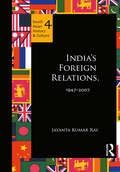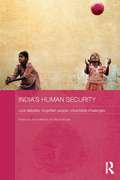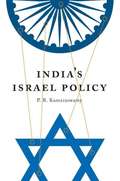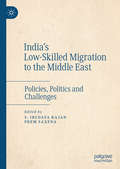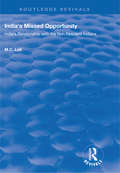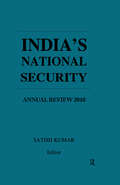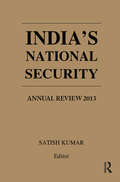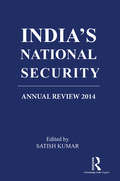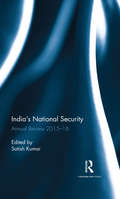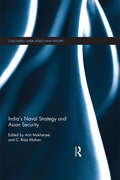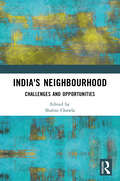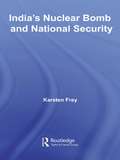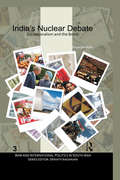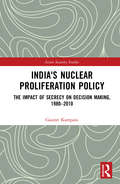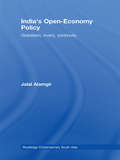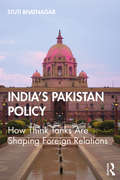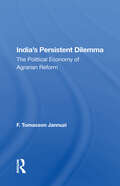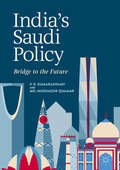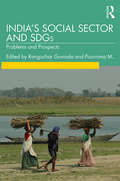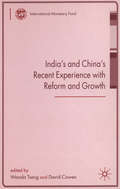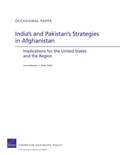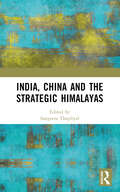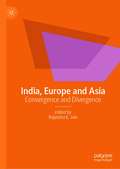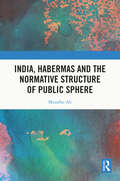- Table View
- List View
India's Foreign Relations, 1947-2007: India's Foreign Relations, 1947-2007 (South Asian History and Culture)
by Jayanta Kumar RayThis book analyses India’s relations with its neighbours (China, Pakistan, Bangladesh, Sri Lanka) and other world powers (USA, UK, and Russia) over a span of 60 years. It traces the roots of independent India’s foreign policy from the Partition and its fallout, its nascent years under Nehru, and non-alignment to the influence of economic liberalization and globalization. The volume delves into the underlying reasons of persistent problems confronting India’s foreign policy-makers, as well as foreign-policy interface with defence and domestic policies. This book will be indispensable to students, scholars and teachers of South Asian studies, international relations, political science, and modern Indian history.
India's Human Security: Lost Debates, Forgotten People, Intractable Challenges (Routledge Studies in South Asian Politics)
by Åshild Kolås Jason MiklianIndia's explosive economic growth and emerging power status make it a key country of interest for policymakers, researchers and scholars within South Asia and around the world. But while many of India's threats and conflicts are strategized and discussed extensively within the confines of security studies, strategic studies and conventional international relations perspectives, many less visible challenges are set to impact significantly on India's potential for economic growth as well as the human security and livelihoods of hundreds of millions of Indian citizens. Drawing on extensive research within India, this book looks at some of the ‘hidden risks’ that India faces, exploring how a broadened scope of what constitutes ‘risk’ itself holds value for Indian security studies practitioners and policymakers. It highlights several human security risks facing India, including the inability of the world’s largest democracy to deal effectively with widespread poverty and health issues, resource depletion and environmental mismanagement, pervasive corruption and institutionalized crime, communal violence, a protracted Maoist insurgency, and deadlocked peace processes in the Northeast among others. The book extracts common themes from these seemingly disparate problems, discussing what underlying failures allow them to persist and why policymakers heavily securitize some political issues while ignoring others. Providing an understanding of how several lesser-studied risks can pose potential or actual threats to Indian society and its ‘emerging power’ growth narrative, this book is a useful contribution to South Asian Studies, International Security Studies and Global Politics.
India's Israel Policy
by P. R. KumaraswamyIndia's foreign policy toward Israel is a subject of deep dispute. Throughout the twentieth century arguments have raged over the Palestinian problem and the future of bilateral relations. Yet no text comprehensively looks at the attitudes and policies of India toward Israel, especially their development in conjunction with history. P. R. Kumaraswamy is the first to account for India's Israel policy, revealing surprising inconsistencies in positions taken by the country's leaders, such as Mahatma Gandhi and Jawaharlal Nehru, and tracing the crackling tensions between its professed values and realpolitik. Kumaraswamy's findings debunk the belief that India possesses a homogenous policy toward the Middle East. In fact, since the early days of independence, many within India have supported and pursued relations with Israel. Using material derived from archives in both India and Israel, Kumaraswamy investigates the factors that have hindered relations between these two countries despite their numerous commonalities. He also considers how India destabilized relations, the actions that were necessary for normalization to occur, and the directions bilateral relations may take in the future. In his most provocative argument, Kumaraswamy underscores the disproportionate affect of anticolonial sentiments and the Muslim minority on shaping Indian policy.
India's Israel Policy
by P. R. KumaraswamyIndia's foreign policy toward Israel is a subject of deep dispute. Throughout the twentieth century arguments have raged over the Palestinian problem and the future of bilateral relations. Yet no text comprehensively looks at the attitudes and policies of India toward Israel, especially their development in conjunction with history.P. R. Kumaraswamy is the first to account for India's Israel policy, revealing surprising inconsistencies in positions taken by the country's leaders, such as Mahatma Gandhi and Jawaharlal Nehru, and tracing the crackling tensions between its professed values and realpolitik. Kumaraswamy's findings debunk the belief that India possesses a homogenous policy toward the Middle East. In fact, since the early days of independence, many within India have supported and pursued relations with Israel. Using material derived from archives in both India and Israel, Kumaraswamy investigates the factors that have hindered relations between these two countries despite their numerous commonalities. He also considers how India destabilized relations, the actions that were necessary for normalization to occur, and the directions bilateral relations may take in the future. In his most provocative argument, Kumaraswamy underscores the disproportionate affect of anticolonial sentiments and the Muslim minority on shaping Indian policy.
India's Low-Skilled Migration to the Middle East: Policies, Politics and Challenges
by S. Irudaya Rajan Prem SaxenaThis book provides new insights and research studies on how developing countries come to terms with the nationalisation policies of Gulf economies that provide employment for their nationals. Focusing on regions and countries that have traditionally been overlooked, it includes studies on labour migration from Egypt to the Middle East and from the Philippines to Lebanon, migrant experiences and policy prospects in Saudi Arabia and Lebanon, and Indian migration to the Gulf. The book fills a critical gap in migration research by studying migration from various Indian states, such as Tamil Nadu, Telugu-speaking states (Telangana and Andhra Pradesh), Rajasthan and Uttar Pradesh. It also explores the unexpected phenomenon of demographic windows of economic opportunity (not documented in demographic literature) observed in a few Arab countries due to older migrant expatriates returning to their home country; the impact of international out-migration on intergenerational educational mobility among children in migrant-sending households in Kerala; and forced migration of Kerala Muslims to the Gulf.
India's Missed Opportunity: India's Relationship with the Non Resident Indians (Routledge Revivals)
by Marie C. LallThis title was first published in 2001. An important analysis of the links between the Indian Diaspora and the state and how this Diaspora can influence economic and foreign policy making in their country of origin. M.C. Lall focuses on India, presenting an unusual case whereby the Indian government in post- independence years ostracized its Diaspora despite the need for outside help with India’s economic development. This in-depth study of the failure of the Indian government to make good use of its Diaspora looks at the reasons why India did not cultivate a relationship after independence; why there was still no change even in light of its economic liberalization and what have been the consequences of this missing relationship.
India's National Security: Annual Review 2010
by Satish KumarThis book gives readers an in-depth and up-to-date account of India’s external and internal threats in a deteriorating global security environment. It shows that while partnerships with some countries have strengthened, anxieties persist with others such as China and Pakistan. Similarly, India has not been able to cope with the challenges of internal security emerging from violence in Kashmir, insurgency in the north-east, to mention a few. Problems of global terrorism and global warming stare us in the face. Tensions between major powers, threats and counter-threats between major and middle powers, and international hotspots like Georgia and Afghanistan remind us that there is intense competition for strategic space. India as an upcoming power is treading its path carefully and is developing meaningful partnerships with all major powers. China’s reluctance to proceed further in resolving the boundary dispute with India, its reported incursions on the borders and its rapid military modernisation has caused anxiety in India. India is nevertheless upgrading its military capability to meet any Chinese threat. Pakistan’s lack of adequate action in punishing those responsible for the 26/11 Mumbai terrorist attack and its reluctance to destroy the infrastructure of terrorism in Pakistan has put a question mark on the future of India Pakistan relations. These and various other threats and challenges are discussed in this volume, latest in a unique series with contributions from academics, political commentators and military personnel.
India's National Security: Annual Review 2013
by Satish KumarIndia’s National Security: Annual Review 2013 comprehensively analyses India’s engagement with major world powers, and immediate neighbours in a complex global security environment. It examines India’s response to internal and external threats, its foreign policy as well as measures taken for strengthening its economic security.
India's National Security: Annual Review 2014
by Satish KumarThis fourteenth volume of India’s National Security Annual Review intensively analyses India’s national security with respect to the changing internal and external dynamics. In the global environment, the situation is characterised by rising tensions between United States and Russia, intensified rivalry between United States (US) and China, and increasing cooperation between China and Russia. For India which seeks peaceful growth to emerge as a major power, this poses severe diplomatic challenges. This volume discusses the complexity of these challenges and the deftness with which India gets the best out of its strategic partnerships with the US and Russia while warding off the transgressions of a mighty adversary like China. It also studies the impact of internal convulsions and external intrusions on India’s security from South Asian nations such as Afghanistan, Bangladesh, Nepal and Sri Lanka. Examining the field of internal security, the essays carry rare insights into the causes of expansion of Naxalite violence in tribal areas and the dynamics of conflict resolution in the Northeast, as well as India’s deep concern as a growing power with its economic slowdown in the recent past, and energy and cyber security. Bringing together contributions from eminent scholars and diplomats, the volume will be indispensable for policymakers, government think tanks, defence and strategic studies experts, as well as students and researchers of international relations, foreign policy and political science.
India's National Security: Annual Review 2015–16
by Satish KumarThe last two years have witnessed deterioration in the global security situation characterised by increasing tensions among major powers. The threat perceptions of the US, China and Russia vis-à-vis each other have sharpened. There is stiff competition among them to dominate the strategic space in different parts of the world. This has led them to formulate national security strategies which are more assertive, aggressive and competitive. There is lack of consensus in resolution of conflicts in Afghanistan and Syria. There is no concerted effort in meeting the challenge of the Islamic State. It is in this fractured security environment that India has been making special efforts to project itself as a leading power commensurate with its economic and military potential. This fifteenth volume of India’s National Security Annual Review undertakes an incisive analysis of India’s endeavours to maximise its gains with respect to its strategic partners. The volume also focuses on the new dynamism that India has injected in its relations with countries in the Middle East and the Asia Pacific. India’s threat perceptions in its extended security zone, critical aspects of its strategic preparedness and complex issues regarding its internal security have been thoroughly examined. With contributions from experts from the fields of diplomacy, academia and civil and military services, the book will be one of the most dependable sources of analyses for scholars of international relations, foreign policy, defence and strategic studies, and political science, and practitioners alike.
India's Naval Strategy and Asian Security (Cass Series: Naval Policy and History)
by C. Raja Mohan Anit MukherjeeThis book examines India’s naval strategy within the context of Asian regional security. Amidst the intensifying geopolitical contestation in the waters of Asia, this book investigates the growing strategic salience of the Indian Navy. Delhi’s expanding economic and military strength has generated a widespread debate on India’s prospects for shaping the balance of power in Asia. This volume provides much needed texture to the abstract debate on India’s rise by focusing on the changing nature of India’s maritime orientation, the recent evolution of its naval strategy, and its emerging defence diplomacy. In tracing the drift of the Navy from the margins of Delhi’s national security consciousness to a central position, analysing the tension between its maritime possibilities and the continentalist mind set, and in examining the gap between the growing external demands for its security contributions and internal ambivalence, this volume offers rare insights into India’s strategic direction at a critical moment in the nation’s evolution. By examining the internal and external dimensions of the Indian naval future, both of which are in dynamic flux, the essays here help a deeper understanding of India’s changing international possibilities and its impact on Asian and global security. This book will be of much interest to students of naval strategy, Asian politics, security studies and IR, in general.
India's Neighbourhood: Challenges and Opportunities
by Shalini ChawlaIndia’s neighbourhood has witnessed crucial developments in the last decade: complex security challenges, looming economic crises, socio-political unrest, border clashes, China’s expanding engagement, India’s rising profile, and the COVID-19 pandemic. Over the last eight years, India has advocated the “Neighbourhood First” policy which ‘focuses on creating mutually beneficial, people-oriented, regional frameworks for stability and prosperity’. India’s neighbourhood presents complex dynamics, and the challenges demand attention and serious consideration in its policy options. The versatile neighbourhood also offers opportunities for India to extend cooperation at the regional level and address common strategic, economic, social and security concerns. India’s Neighbourhood: Challenges and Opportunities with insights of leading experts is a timely contribution to academia, practitioners, and keen readers. The book fills a critical void in the domain of neighbourhood studies and comprehensively analyses India’s bilateral relations with Afghanistan, Bangladesh, Bhutan, China, Iran, the Maldives, Myanmar, Nepal, Pakistan, and Sri Lanka. The book assesses the traditional security challenges like terrorism, examines crucial non-traditional security issues (hydro-politics and climate change), scans the emerging dynamics of rare earth elements and evaluates the wider possibilities of India’s role in stirring regional cooperation in these key areas. Print edition not for sale in South Asia (India, Sri Lanka, Nepal, Bangladesh, Pakistan and Bhutan)
India's Nuclear Bomb and National Security (Routledge Advances in South Asian Studies #Vol. 4)
by Karsten FreyIndia’s Nuclear Bomb and National Security gives an analytic account of the dynamics of India's nuclear build up. It puts forward a new comprehensive model, which goes beyond the classic strategic model of accepting motives of arming behaviour, and incorporates the dynamics in India’s nuclear programme. The core argument of the book surrounds the question about India's security considerations and their impact on India's nuclear policy development. Karsten Frey explores this analytic model by including explanatory variables on the unit-level, where interests are generally related to symbolic, less strategic values attributed to nuclear weapons. These play a significant role within India's domestic political party competition and among certain pressure groups. They also impacted India's relationship with other countries on non-proliferation matters, for example the concept of the country's 'status' and 'prestige'. Identifying the role of the strategic elite in determining India's nuclear course, this book also argues that one of the pivotal driving forces behind India's quest for the nuclear bomb is India's struggle for international recognition and the strong, often obsessive sensitivities of India's elite regarding 'acts of discrimination' or 'ignorance' by the West towards India.
India's Nuclear Debate: Exceptionalism and the Bomb (War and International Politics in South Asia)
by Priyanjali MalikMaking the right-wing Bharatiya Janata Party’s nuclear tests in 1998 its starting point, this book examines how opinion amongst India’s ‘attentive’ public shifted from supporting nuclear abstinence to accepting — and even feeling a need for — a more assertive policy, by examining the complexities of the debate in India on nuclear policy in the 1990s. The study seeks to account for the shift in opinion by looking at the parallel processes of how nuclear policy became an important part of the public discourse in India, and what it came to symbolise for the country’s intelligentsia during this decade. It argues that the pressure on New Delhi in the early 1990s to fall in line with the non-proliferation regime, magnified by India’s declining global influence at the time, caused the issue to cease being one of defence, making it a focus of nationalist pride instead. The country’s nuclear programme thus emerged as a test of its ability to withstand external compulsions, guaranteeing not so much the sanctity of its borders as a certain political idea of it — that of a modern, scientific and, most importantly, ‘sovereign’ state able to defend its policies and set its goals.
India's Nuclear Proliferation Policy: The Impact of Secrecy on Decision Making, 1980–2010 (Asian Security Studies)
by Gaurav KampaniThis book examines India’s nuclear program, and it shows how secrecy inhibits learning in states and corrodes the capacity of decision-makers to generate optimal policy choices. Focusing on clandestine Indian nuclear proliferation during 1980–2010, the book argues that efficient decision-making is dependent on strongly established knowledge actors, high information turnover and the capacity of leaders to effectively monitor their agents. When secrecy concerns prevent states from institutionalizing these processes, leaders tend to rely more on heuristics and less on rational thought processes in choices involving matters of great political uncertainty and technical complexity. Conversely, decision-making improves as secrecy declines and policy choices become subject to higher levels of scrutiny and contestation. The arguments in this book draw on compelling evidence gathered from interviews conducted by the author, with interviewees including individuals who were involved in nuclear planning in India from 1980 to 2010, such as former cabinet and defence secretaries, the principal secretary to the prime minister, national security advisors, secretaries to the department of atomic energy, military chiefs of staff and their principal staff officers, and commanders of India’s strategic (nuclear) forces. This book will be of much interest to students of nuclear proliferation, Asian politics, strategic studies and International Relations.
India's Open-Economy Policy: Globalism, Rivalry, Continuity (Routledge Contemporary South Asia Series #Vol. 14)
by Jalal AlamgirThis book is the first major exploration of Indian political economy using a constructivist approach. Arguing that India’s open-economy policy was made, justified, and continued on the basis of the idea of openness more than its tangible effect, the book explains what sustained the idea of openness, what philosophy, interpretations of history, and international context gave it support, justification, and persuasive force. Drawing on a wide range of contemporary and historical sources, and going as far back as the 19th century, the author reconstructs how Indian policymakers have interpreted economic priorities, perceived success and failure, and evaluated the destiny of their nation. By the 1990s, their imperatives increasingly highlighted a sense of rivalry, especially with China, and globalism, a desire to play a strong role in world affairs. The book shows how a sense of nationalist urgency was created through globalism and rivalry, allowing policymakers to privilege international needs over domestic political demands, replace economic independence with interdependence as a priority, and ensure that the broad basis of India’s openness could not be challenged effectively even though certain policies faced severe opposition. This book will be of interest to those working on International Political Economy, Globalization, Economic History, Public Policy, and South Asian politics.
India's Pakistan Policy: How Think Tanks Are Shaping Foreign Relations
by Stuti BhatnagarThis book critically examines the role of think tanks as foreign policy actors. It looks at the origins and development of foreign policy think tanks in India and their changing relevance and position as agents within the policy-making process. The book uses a comparative framework and explores the research discourse of prominent Indian think tanks, particularly on the India–Pakistan dispute, and offers unique insights and perspectives on their research design and methodology. It draws attention to the policy discourse of think tanks during the Composite Dialogue peace process between India and Pakistan and the subsequent support from the government which further expanded their role. One of the first books to offer empirical analyses into the role of these organisations in India, this book highlights the relevance of and the crucial role that these institutions have played as non-state policy actors. Insightful and topical, this book will be of interest to researchers focused on international relations, foreign policy analysis and South Asian politics. It would also be a good resource for students interested in a theoretical understanding of foreign policy institutions in general and Indian foreign policy in particular.
India's Persistent Dilemma: The Political Economy Of Agrarian Reform
by F. Tomasson JannuziThis book shows that the failure of successive Indian governments to effect meaningful agrarian reforms has led to a political economy in rural India that is shaped, as it was prior to independence, largely by the interests of an elite minority of landholders. .
India's Saudi Policy: Bridge to the Future
by P. R. Kumaraswamy Md. Muddassir QuamarThe book traces India’s Saudi Policy and locates the current state of bilateral relations and the challenges it faces. It argues that during the Cold War the relations were largely shaped by the Pakistan factor which in turn inhibited both sides from exploring the importance and value of one another. As a result, the relations were largely transactional and marginal. The end of the Cold War coincided with two interesting developments, namely, significant growth in India’s economic power and influence and the de-hyphenation of Pakistan from its Middle East policy. This resulted in greater political engagements between India and Saudi Arabia and was strengthened by the growing energy trade ties. For long expatiate population and haj have been the backbone of the relations, and they have been new instruments as India looks to enhance its engagements with the Kingdom through investments opportunities, political contacts, shared security concerns and strategic cooperation. India’s Saudi policy, however, face many challenges most importantly the regional instability, the Iran factor, low oil price and the international dynamics. The book will be the first comprehensive work on the India-Saudi relations. Though targeting a wider audience, it will be academically grounded and based on primary sources collected from India and Saudi Arabia.
India's Social Sector and SDGs: Problems and Prospects
by Rangachar Govinda Poornima M.This book explores the intersectional perspective of sustainable social development in key sectors, such as education and skill development, health and nutrition, gender concerns, and food security and agriculture in India. It delves into contemporary concerns of poverty, employment and inclusive growth, and social marginalisation and inequality. The volume brings together the contributions of various stakeholders from academia, research organisations, NGOs and policymakers to address social-sector issues and sustainable development goals (SDGs) in the Indian context. It reflects on policies, strategies and performance in the context of Constitutional goals and the commitment to global SDGs and examines the character and contours of social development in the country. Comprehensive and topical, this volume will be useful to scholars, researchers, policymakers and practitioners of development studies, political studies, sociology and development economics.
India's and China's Recent Experience with Reform and Growth
by Wanda Tseng David CowenChina and India already rank among the world's largest economies, and each is moving rapidly towards the centre stage of the global economy. In this process different priorities have been placed on economic reforms in the past two decades - China taking a more outward strategy and India, until recently, a more inward one. Can they continue to rank among the fastest expanding economies? This volume addresses the issue, highlighting what has worked and what more needs to be done to ensure sustained rapid economic growth and poverty reduction. Addressing the two countries' recent experiences with growth and reform, this book provides important insight for other developing economies.
India's and Pakistan's Strategies in Afghanistan: Implications for the United States and the Region
by Peter Chalk Larry HanauerIndia and Pakistan have very different visions for Afghanistan, and they seek to advance highly disparate interests through their respective engagements in the country. This paper reviews the countries' interests in Afghanistan, how they have tried to further their interests, how Afghanistan navigates their rivalry, and the rivalry's implications for U. S. and Indian policy.
India, China and the Strategic Himalayas
by Sangeeta ThapliyalThis book analyses strategic discourse on the Himalayas from the perspective of India’s interests. Home to many communities, cultures, natural resources and political boundaries, it is the geopolitical landscape of the Himalayas between India and China that dominates other narratives and discourses. The traditional notion of Himalayas as India’s frontiers and buffer is challenged by China. Despite various mechanisms to address border resolution there are violations and transgressions from China. This book examines India’s responses to the new emerging challenges in the Himalayas. How the statist discourse on strategic interests incorporates people’s discourse. It provides a nuanced understanding of India’s strategic undertakings, diplomatic initiatives and development framework. This book will be a valuable addition to existing knowledge on the Himalayas between India and China. Scholars and practitioners interested in International Relations, Strategic Studies, Himalayan Studies and South Asian Studies will find it useful. Print edition not for sale in South Asia (India, Sri Lanka, Nepal, Bangladesh, Pakistan and Bhutan)
India, Europe and Asia: Convergence and Divergence
by Rajendra K. JainThis book examines the economic, political and security interests of India, Europe and the European Union towards Asia. It analyses their participation in major Asian multilateral organizations, responses to connectivity and Brussels’ differential engagement of China and India. It evaluates Indian and European/EU policy towards West Asia, the Iran Imbroglio, the Indo-Pacific and South Asia (Afghanistan, Myanmar and Kashmir). It highlights the elements of convergence/divergence and assesses the challenges and prospects of India-European cooperation in the context of a more assertive China and growing European engagement with Asia.
India, Habermas and the Normative Structure of Public Sphere
by Muzaffar AliThis book examines how the contemporary Indian situation poses a strict theoretical challenge to Habermas’s theorization of the public sphere and employs the method of samvāda to critically analyse and dissect its universalist claims. It invites the reader to consider the possibility of imagining a normative Indian public sphere that is embedded in the Indian context—in a native and not nativist sense—to get past the derivative language of philosophical and political discourses prevalent within Indian academia. The book proposes that the dynamic cooperative space between Indian political theory and contemporary Indian philosophy is effectively suited to theorize the native idea of the Indian public sphere. It underlines the normative need for a natively theorized Indian public sphere to further the multilayered democratization of public spheres within diverse communities that constitute Indian society. The book will be a key read for contemporary studies in philosophy, political theory, sociology, postcolonial theory, history and media and communication studies.
